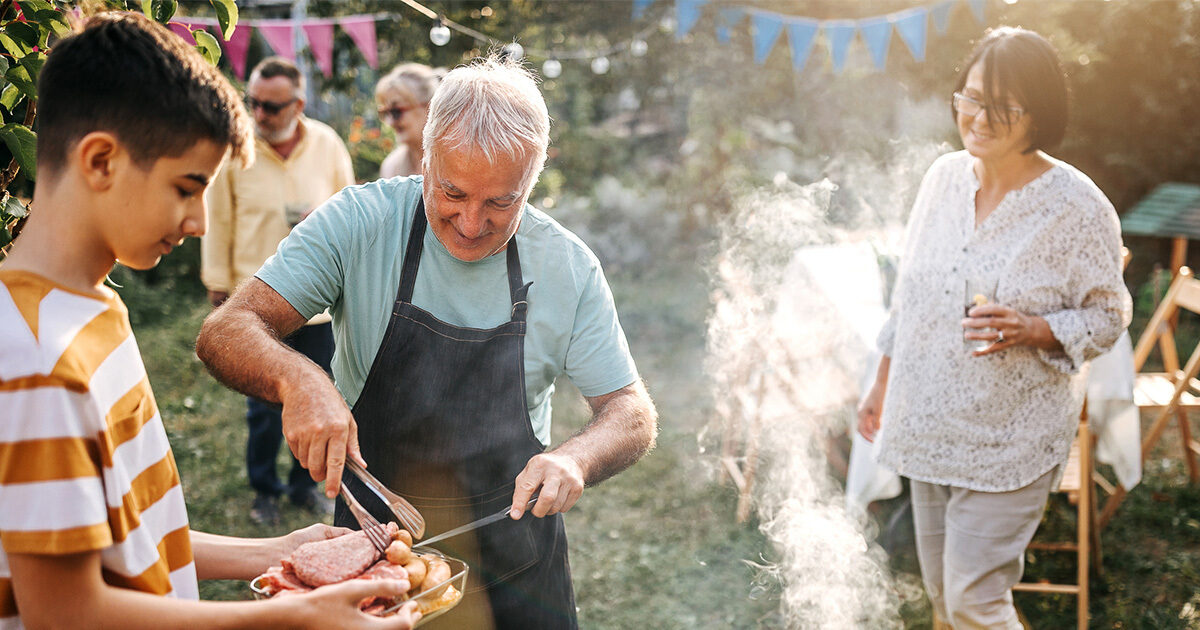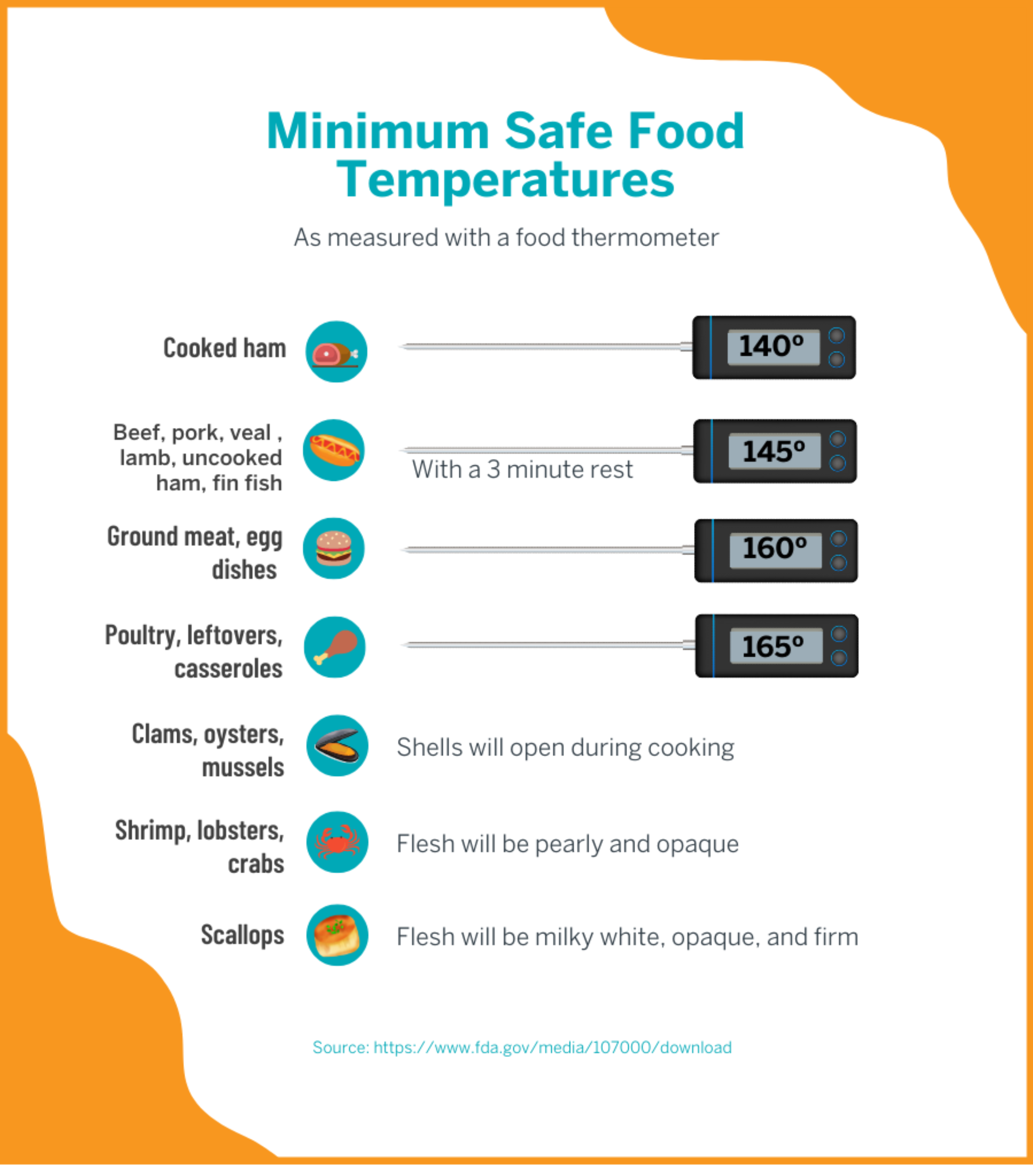Food Safety for Any Outdoor Summer Event
UT Health Austin dietitian shares tips on practicing outdoor food safety during hot summer days to help keep you and your loved ones healthy and safe
Reviewed by: Carla Cos, RDN, LD
Written by: Kaylee Fang

When preparing an outdoor meal, a top priority for most Central Texans is avoiding ants and sunburn. However, without proper food safety measures, a relaxing picnic or cookout can result in serious health issues. UT Health Austin dietitian Carla Cos, RDN, LD, of the Primary Care and Health Social Work care teams, shares tips on practicing outdoor food safety to keep you and your loved ones healthy and safe.
“We really want to make sure that we take food safety seriously,” says Cos. “It’s necessary to take precautions because bacteria multiples very quickly the hotter it gets.”
Proper Storage
<br>Cold Foods
A cooler is the best method to store refrigerated food. Cold foods should be stored below 40 °F.
Consider packing the following to keep your food cold:
- Ice
- Frozen gel packs
- Frozen water bottles
In the heat, frozen water bottles will eventually melt, and you can serve the cool water later in the day to your friends and family, making it a desirable alternative to ice. Beverages are typically sought more often during summer days, and coolers will lose chill temperatures when they are constantly opened. If you plan on packing other cold beverages, consider bringing a separate cooler just for these drinks.
Hot Foods
The best way to keep hot foods warm is by placing them near the outdoor cooking appliance, such as a grill or griddle, you may be using. Hot foods should be stored above 140 °F.
Prepared Foods
When bringing prepared food from home, be sure to transport it in a leakproof container to prevent spill or any cross-contamination.
To prevent juices or cross-contamination, consider using:
- Tupperware
- Ziplock bags
- Vacuum pouches
Danger Zone
“The biggest mistake people make is leaving food out for too long,” shares Cos. “People often get distracted by visiting with family, swimming in the pool, or participating in other activities, and the food just stays out. This lack of proper storage can cause people to get sick.”
Bacteria grow most rapidly in the range of temperatures between 40 °F and 140 °F, doubling in number in as little as 20 minutes. This range of temperatures is often referred to as the “Danger Zone.” You want food to pass through the temperature danger zone as quickly as possible. A general recommendation is not to let food remain in that danger zone for more than two hours.
“Keep hot food hot and cold food cold,” advises Cos. “Always use a thermometer to check internal food temperatures.”
According to FDA, if outdoor temperatures are above 90 °F, food should only be left out for an hour. Ideally, you want to keep everything properly stored until people are ready to be served, and once people are finished eating, you want to immediately return everything to its proper place.

Food Safety Tips
<br>Separating foods
You can prevent foodborne illnesses by separating foods. Uncooked foods, such as raw meats and eggs, shouldn’t come in contact with ready-to-eat foods. Place vegetables, fruits, and even prepared salads in separate containers. All foods should be stored in their own separate containers and, where possible, their own separate coolers to avoid any cross-contamination.
Cooking meat
Be sure to cook raw foods to the correct internal temperature. For instance, poultry products, such as chicken or turkey, should be cooked to an internal temperature of 165 °F. The best way to determine whether the meat is ready is by checking the internal temperature with a food thermometer. Although this may not be a frequent practice in a picnic setting, it can help prevent a trip to the hospital.
Sanitization
Always wash or sanitize your hands and surfaces. It’s easy to dismiss proper hygiene when bathroom and kitchen sinks aren’t as accessible. Remember to wash all produce at home prior to packing it. Cutting foods, such as fruits or vegetables, at home when you have easy access to clean work surfaces can help minimize contact with bacteria.
Foods to Avoid
Mayonnaise, dairy, and seafood tend to spoil the quickest in high temperatures, causing common picnic foods, such as potato salads or egg salads, to be at an elevated risk for harmful bacteria. Be mindful of storing these foods at lower temperatures.
Alternative Foods to Pack
Foods that don’t require refrigeration are best for picnics and cookouts. Opt for fruits that don’t need to be cut or stored in cooler temperatures, such as mandarin oranges, bananas, pears, or apples, instead of preparing a fruit salad. Grapes are another great alternative, as you can freeze them, resulting in a nice cold treat for later. Baked chips or tortilla chips can provide a healthier alternative to potato salad. Olive oil or vinegar can also provide a substitute for mayonnaise in bean, pasta, and quinoa salads. Instead of bringing pre-made refrigerated tuna salad, try packing nonperishable tuna pouches and make sandwiches on the spot.
Convenient foods that don’t require refrigeration include:
- Trail mix with nuts
- Dried fruits
- Granola bars
- Crackers
- Nut butter sandwiches
- Jerky
- Baked chips
- Cookies
- Brownies
“Have a good balance of things that don’t require refrigeration and then those that might,” suggests Cos, “Avoid having a cooler full of several perishable side items.”
Depending on your specific healthcare needs, a dietitian may be a part of your healthcare journey at UT Health Austin. For more information or make an appointment with UT Health Austin, call 1-833-UT-CARES (1-833-882-2737) or visit here.